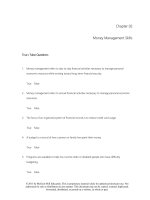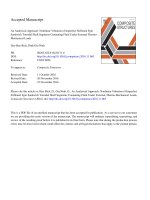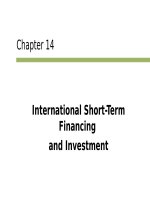Lecture International finance: An analytical approach (3/e): Chapter 7 - Imad A. Moosa
Bạn đang xem bản rút gọn của tài liệu. Xem và tải ngay bản đầy đủ của tài liệu tại đây (465.27 KB, 60 trang )
Chapter 7
International Banking and the
Basel Accords
Objectives
• To find out why banks are assigned special
importance and why banking is more regulated than
other business
• To consider the types of risk a bank is exposed to
• To consider the pros and cons of banking regulation
(cont.)
Copyright 2010 McGraw-Hill Australia Pty Ltd
PPTs t/a International Finance: An Analytical Approach 3e by Imad A. Moosa
Slides prepared by Afaf Moosa
7-2
Objectives (cont.)
• To outline the regulatory functions and the forms of
banking regulation
• To evaluate the Basel I and Basel II accords
Copyright 2010 McGraw-Hill Australia Pty Ltd
PPTs t/a International Finance: An Analytical Approach 3e by Imad A. Moosa
Slides prepared by Afaf Moosa
7-3
Why banks are important
• Banking regulation centres on the objective of
minimising the possibility of bank failure because
banks command more importance than other
financial and non-financial firms
• The failure of banks creates more turmoil in the
economy than perhaps any other kind of firm
Copyright 2010 McGraw-Hill Australia Pty Ltd
PPTs t/a International Finance: An Analytical Approach 3e by Imad A. Moosa
Slides prepared by Afaf Moosa
7-4
Reasons for the special importance
of banks
• The difference between the degrees of liquidity of
their assets and liabilities, which makes them highly
vulnerable to depositor withdrawal and bank runs in
extreme cases
• Banks are at the centre of the payment system (they
are the creators of money, the medium of exchange)
(cont.)
Copyright 2010 McGraw-Hill Australia Pty Ltd
PPTs t/a International Finance: An Analytical Approach 3e by Imad A. Moosa
Slides prepared by Afaf Moosa
7-5
Reasons for the special importance
of banks (cont.)
• They face an asymmetric loss function, which is a
consequence of handling other people’s money
• The sheer size of the interbank market, resulting
from the fact that banks deal with each other on a
massive scale
(cont.)
Copyright 2010 McGraw-Hill Australia Pty Ltd
PPTs t/a International Finance: An Analytical Approach 3e by Imad A. Moosa
Slides prepared by Afaf Moosa
7-6
Reasons for the special importance
of banks (cont.)
• The failure of banks leads to a reduction in credit
flows to the rest of the economy, and hence adverse
economic consequences
• The levels of turnover and product innovation are
high, making it unlikely that employees would
experience full business and product cycles
Copyright 2010 McGraw-Hill Australia Pty Ltd
PPTs t/a International Finance: An Analytical Approach 3e by Imad A. Moosa
Slides prepared by Afaf Moosa
7-7
The kinds of risk facing banks
• Financial risk
Credit risk
Market risk
•
•
•
•
•
•
Interest rate risk
Foreign exchange risk
Equity price risk
Commodity price risk
Energy price risk
Real estate price risk
(cont.)
Copyright 2010 McGraw-Hill Australia Pty Ltd
PPTs t/a International Finance: An Analytical Approach 3e by Imad A. Moosa
Slides prepared by Afaf Moosa
7-8
The kinds of risk facing banks
(cont.)
• Non-financial risk
Operational risk
Other kinds of non-financial risk
Copyright 2010 McGraw-Hill Australia Pty Ltd
PPTs t/a International Finance: An Analytical Approach 3e by Imad A. Moosa
Slides prepared by Afaf Moosa
7-9
Examples of operational risk
•
•
•
•
•
•
Liquidity risk
Herstatt risk
Compliance risk
Processing risk
System risk
Human resources risk
(cont.)
Copyright 2010 McGraw-Hill Australia Pty Ltd
PPTs t/a International Finance: An Analytical Approach 3e by Imad A. Moosa
Slides prepared by Afaf Moosa
7-10
Examples of operational risk (cont.)
•
•
•
•
•
Crime risk
Disaster risk
Fiduciary risk
Model risk
Legal risk
Copyright 2010 McGraw-Hill Australia Pty Ltd
PPTs t/a International Finance: An Analytical Approach 3e by Imad A. Moosa
Slides prepared by Afaf Moosa
7-11
Examples of other non-financial risk
•
•
•
•
•
•
•
•
Business risk
Reputational risk
Macroeconomic risk
Business cycle risk
Country risk
Political risk
Sovereign risk
Purchasing power risk
Copyright 2010 McGraw-Hill Australia Pty Ltd
PPTs t/a International Finance: An Analytical Approach 3e by Imad A. Moosa
Slides prepared by Afaf Moosa
7-12
Operational risk
• The risk of loss resulting from the failure of people,
processes, systems or from external events.
• It is more diverse than either credit risk or market
risk
Copyright 2010 McGraw-Hill Australia Pty Ltd
PPTs t/a International Finance: An Analytical Approach 3e by Imad A. Moosa
Slides prepared by Afaf Moosa
7-13
Types of operational loss events
Event
I nternal fraud
Definition
Losses due to acts of fraud
involving at least one
internal party.
External fraud
Same as internal fraud
except that it is carried out
by an external party.
Employment
Losses arising from
practices and
violation of employment
workplace safety and health and safety
laws.
Client s, products Losses arising from failure
and business
to meet obligations to
practices
clients or from the design
of a product.
Damage t o
Losses arising from
physical assets
damage inflicted on
physical assets by a
natural disaster or another
event.
Business
Losses arising from
disruption and
disruptions to or failures in
system failures
systems,
telecommunication and
utilities.
Execution,
Losses arising from failed
delivery and
transact ion processing
process
with counterparties such
management
as vendors
Example
Bribes, credit fraud and theft
Computer hacking and forgery
Discrimination
Product defects and misuse of
confidential information
Terrorism, vandalism and
natural disasters
Hardware, soft ware and
telecommunications
Negligent loss or damage of
client assets and unapproved
access to accounts
Copyright 2010 McGraw-Hill Australia Pty Ltd
PPTs t/a International Finance: An Analytical Approach 3e by Imad A. Moosa
Slides prepared by Afaf Moosa
7-14
Operational risk in the FX market
• One reason for the increasing level of operational
risk encountered in executing foreign exchange
transactions is increasing diversity of the foreign
exchange market, which is no longer dominated by
commercial banks
(cont.)
Copyright 2010 McGraw-Hill Australia Pty Ltd
PPTs t/a International Finance: An Analytical Approach 3e by Imad A. Moosa
Slides prepared by Afaf Moosa
7-15
Operational risk in the FX market
(cont.)
• The level of operational risk in the foreign exchange
market has risen also because the increasing
complexity and size of the market have made it
necessary to introduce regular changes in trading
procedures, trade capture systems, operational
procedures and risk management tools
Copyright 2010 McGraw-Hill Australia Pty Ltd
PPTs t/a International Finance: An Analytical Approach 3e by Imad A. Moosa
Slides prepared by Afaf Moosa
7-16
Justification for banking regulation
• Banking regulation can be justified on the basis of
market failure such as externalities, market power,
and asymmetry of information between buyers and
sellers
• The second justification for banking regulation is the
inability of depositors to monitor banks
Copyright 2010 McGraw-Hill Australia Pty Ltd
PPTs t/a International Finance: An Analytical Approach 3e by Imad A. Moosa
Slides prepared by Afaf Moosa
7-17
Arguments against banking
regulation
• Some economists dispute the arguments typically
presented in favour of bank regulation
• There is significant scepticism about the role of
regulation as a means of achieving financial stability
• Regulators do not take into account the fact that risk
creates value and that profits come from taking risk
Copyright 2010 McGraw-Hill Australia Pty Ltd
PPTs t/a International Finance: An Analytical Approach 3e by Imad A. Moosa
Slides prepared by Afaf Moosa
7-18
Regulation in the post-crisis era
• While the proponents of banking regulation argue
that their views have been vindicated by the global
financial crisis, those who hold opposite views still
argue otherwise
• Some proponents of free banking assert that the
impact of the crisis would have been worse if it were
not for deregulation
Copyright 2010 McGraw-Hill Australia Pty Ltd
PPTs t/a International Finance: An Analytical Approach 3e by Imad A. Moosa
Slides prepared by Afaf Moosa
7-19
Regulatory functions
• Macroprudential supervision is intended to limit
financial system distress that might damage the
economy
• Microprudential supervision focuses on the solvency
of individual institutions rather than the whole system
• Conduct-of-business regulation is also justified in
terms of consumer protection
Copyright 2010 McGraw-Hill Australia Pty Ltd
PPTs t/a International Finance: An Analytical Approach 3e by Imad A. Moosa
Slides prepared by Afaf Moosa
7-20
Segregation of regulatory functions
• The segregation of regulatory functions (for example,
between APRA and the RBA in Australia) is a
controversial issue on which there is no consensus
• Some would argue that one lesson learned from the
global financial crisis pertains to the segregation of
supervisory roles, particularly between central banks
and other supervisors
Copyright 2010 McGraw-Hill Australia Pty Ltd
PPTs t/a International Finance: An Analytical Approach 3e by Imad A. Moosa
Slides prepared by Afaf Moosa
7-21
Forms of banking regulation
• Deposit insurance: Arguments against are moral
hazard and adverse selection
• Operations regulation, including loans (highly
leveraged activities), investment in securities and offbalance sheet transactions
(cont.)
Copyright 2010 McGraw-Hill Australia Pty Ltd
PPTs t/a International Finance: An Analytical Approach 3e by Imad A. Moosa
Slides prepared by Afaf Moosa
7-22
Forms of banking regulation (cont.)
• Regulation of the accounting process, which became
necessary following the accounting scandals at
Enron and WorldCom
• In 2002, the Sarbanes-Oxley Act was implemented in
the United States to make corporate managers,
board members and auditors more accountable for
the accuracy of the financial statements of their firms
(cont.)
Copyright 2010 McGraw-Hill Australia Pty Ltd
PPTs t/a International Finance: An Analytical Approach 3e by Imad A. Moosa
Slides prepared by Afaf Moosa
7-23
Forms of banking regulation (cont.)
• Capital-based regulation requires banks to be
subject to capital requirements, holding a minimum
capital ratio, which is the ratio of capital to total
assets
• This is the basis of the Basel accords
Copyright 2010 McGraw-Hill Australia Pty Ltd
PPTs t/a International Finance: An Analytical Approach 3e by Imad A. Moosa
Slides prepared by Afaf Moosa
7-24
Global banking regulation
• The Basel accords
• The US International Banking Act of 1978
• The Single European Act of 1987
Copyright 2010 McGraw-Hill Australia Pty Ltd
PPTs t/a International Finance: An Analytical Approach 3e by Imad A. Moosa
Slides prepared by Afaf Moosa
7-25









